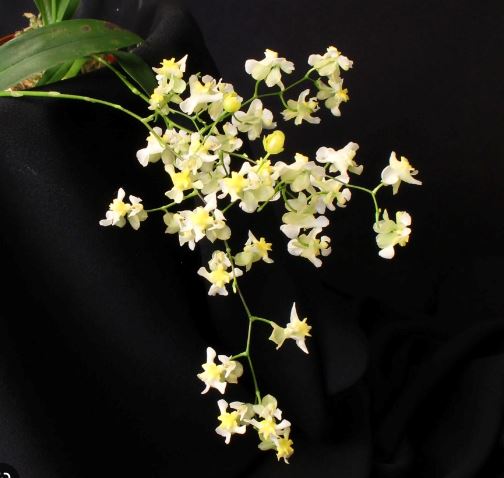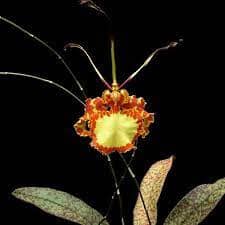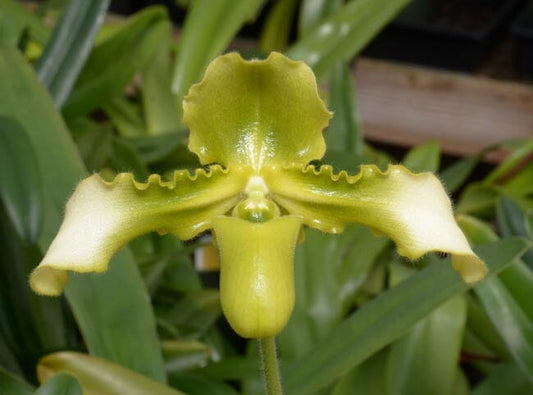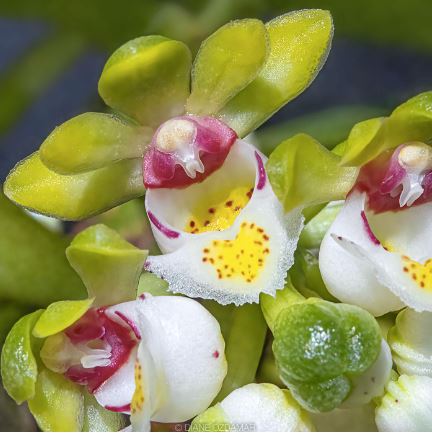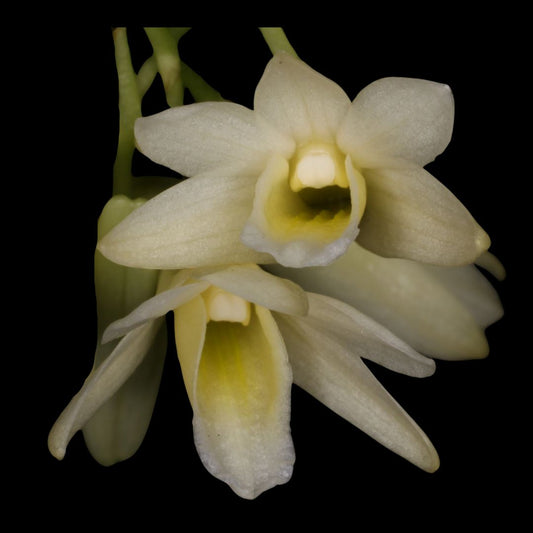La Foresta Orchids
Coelogyne viscosa
Coelogyne viscosa
Out Of Stock!
We will notify you when this product becomes available.
No se pudo cargar la disponibilidad de retiro
Share
Introducing the Exquisite Coelogyne viscosa Orchid - Your Ticket to a Fragrant, Tropical Oasis!
Originating from the lush landscapes of India, Malaysia, China, Laos, Myanmar, and Vietnam, the Coelogyne viscosa is a botanical masterpiece that thrives as a medium-sized, warm-growing epiphyte or lithophyte. Found nestled in the canopies of evergreen lowland forests and primary montane forests at an altitude of 700 to 1000 meters above sea level, this orchid captivates with its unique features and enchanting fragrance.
Botanical Beauty: Admire the elegance of this orchid with its clustered, narrow ovoid or fusiform pseudobulbs, boasting a glossy, grooved exterior. The lanceolate leaves, plicate and finely nerved, extend up to 50 cm, creating a striking visual appeal. Coelogyne viscosa graces us with its presence in winter, showcasing an erect, 2 to 4 flowered, slender racemose inflorescence, bearing simultaneously opening, fragrant flowers with delicate hues of white, yellow, and dark brown on the lip.
Cultivation Tips:
1. Light: Give your Coelogyne viscosa the spotlight it deserves! Place it where it can bask in bright, indirect sunlight. Shield it from the harsh midday sun on southern windowsills and the intense evening rays on western windows by using a curtain or placing it in the shade of other plants.
2. Temperature: Maintain a moderately warm environment with day temperatures between 24-30 °C and night temperatures not falling below 14 °C. Create the ideal conditions by ensuring a 4-6 °C temperature drop at night compared to the daytime temperatures.
3. Humidity: This orchid thrives in a humidity level ranging from 55% to 70%. Elevate humidity in tandem with rising temperatures, ventilating the room regularly to prevent fungal diseases and ensure optimal growth.
4. Substrate and Repotting: Grow Coelogyne viscosa in pendant pots or wooden trellised baskets using a mixture of coniferous tree bark, sphagnum moss, and charcoal. Repot only when necessary, preferably after flowering, to prevent substrate issues or when the plant outgrows its container.
5. Watering: Tailor your watering routine to the temperature; higher temperatures call for more frequent watering. Ensure excess water drains freely from the pot to prevent root rot. Let the substrate dry between waterings but avoid complete dryness.
6. Fertilizer: Feed this orchid during the new growth period with a balanced fertilizer (NPK = 3-3-3 or 8-8-8) at 1/2 or 1/4 concentration during every third watering. Alternate between root and foliar feedings for optimal nutrition. Regularly wash the substrate to prevent salinization.
7. Rest Period: Coelogyne viscosa doesn't demand a specific rest period for flowering. After blooming, remove the flower stalk, consider repotting if needed, and allow the orchid to stay relatively dry to acclimatize and prevent root rot.
This is a blooming size division in a 3" or 4” pot, newly repotted, about 1 to 2 years to bloom, grown from seed, limited!
Transform your space into a tropical haven with the Coelogyne viscosa - an orchid that not only captivates the eyes but also enchants the senses with its delightful fragrance. Cultivate this botanical marvel and let it bloom into a masterpiece of nature in your own home!
📦 **Excludes selected oversized, overweight orchids & Hoyas 📦
You may also like
-
Oncidium Chian Tzy Chiou Ping
Precio habitual$39.95 USD Precio habitual$39.95 USD $39.95 USD -
Oncidium Alliance - Psychopsis Mendenhall 'Hildos' FCC/AOS
Precio habitual A partir de$39.95 USD Precio habitual$49.95 USD $39.95 USD Oferta -
Oncidium Sharry Baby 'Red Fantasy'
Precio habitual$39.95 USD Precio habitual$39.95 USD $39.95 USD -
Oncidium Alliance: Sigmatostylix radicans
Precio habitual$39.95 USD Precio habitual$39.95 USD $39.95 USD -
Paphiopedilum hirsutissimum var. esquirolei frm. album
Precio habitual$49.95 USD Precio habitual$49.95 USD $49.95 USD -
Gastrochilus japonicus
Precio habitual$49.95 USD Precio habitual$49.95 USD $49.95 USD -
Dendrochilum wenzelii
Precio habitual$49.95 USD Precio habitual$49.95 USD $49.95 USD -
Dendrobium platycaulon
Precio habitual$49.95 USD Precio habitual$49.95 USD $49.95 USD







